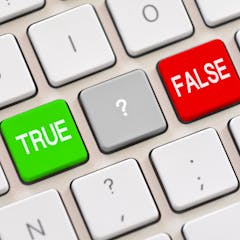
Articles on Cognitive bias
Displaying 41 - 60 of 74 articles

Was the government correct to think that adherence would fall over time? Perhaps.

The only way around psychological biases is more transparency.

Is making sense of a story more important than getting at its truth? Looking at the treatment of myth in ancient Greece may help us navigate what is true, and whether that matters.

Neither jurors nor judges can be relied upon to put aside their incorrect beliefs about rape. What’s the answer?

Self-proclaimed gluten sensitivity is on the rise, and so is the stereotype that it goes along with being a politically correct progressive. But is gluten actually a good proxy for social values?

Research into contextual bias needs to be more rigorous so recommendations can be made about its effect on forensic analysis.

Sports fans see it all the time: two people arguing about a split-second difference in who did what. New research suggests human beings have a bias to perceive their own actions as happening sooner.

Media reports are starting to directly connect climate change to its weather effects in local communities. But how you respond to those linkages depends on what you already think about climate change.

We rely on depth to perceive objects, but not all of us see depth in the same way.

It’s a psychological quirk that when something becomes rarer, people may spot it in more places than ever. What is the ‘concept creep’ that lets context change how we categorize the world around us?

Information on social media can be misleading because of biases in three places – the brain, society and algorithms. Scholars are developing ways to identify and display the effects of these biases.

Under some circumstances, people may feel wealthier than they actually are and this makes them psychologically more prone to increase their spending, as well as their borrowing.

Cognitive psychologists know the way our minds work means we not only don’t notice errors and misinformation we know are wrong, we also then remember them as true.

Can a computer model correctly predict the results of the first round in this year’s tournament? These mathematicians think so.

Mental short-cuts guide our everyday decision-making. Unfortunately, five biases can lead us to deny responsibility for our poor decisions and are creating problems for share-bike schemes.

Lay workers are being trained to help Zimbabwe manage mental issues in communities. So far it’s proving successful.

Feel like something will be easy to remember? Your prediction may be influenced by how clearly the information was presented in the first place.

The next financial crisis might be caused not by greed, but a human bias towards safety.

For 30 years, sports fans have been told to forget about streaks because the ‘hot hand’ is a fallacy. But a reanalysis says not so fast: Statistics show players really are in the zone sometimes.

If someone sees or hears something they don’t want to believe…they probably won’t believe it.
